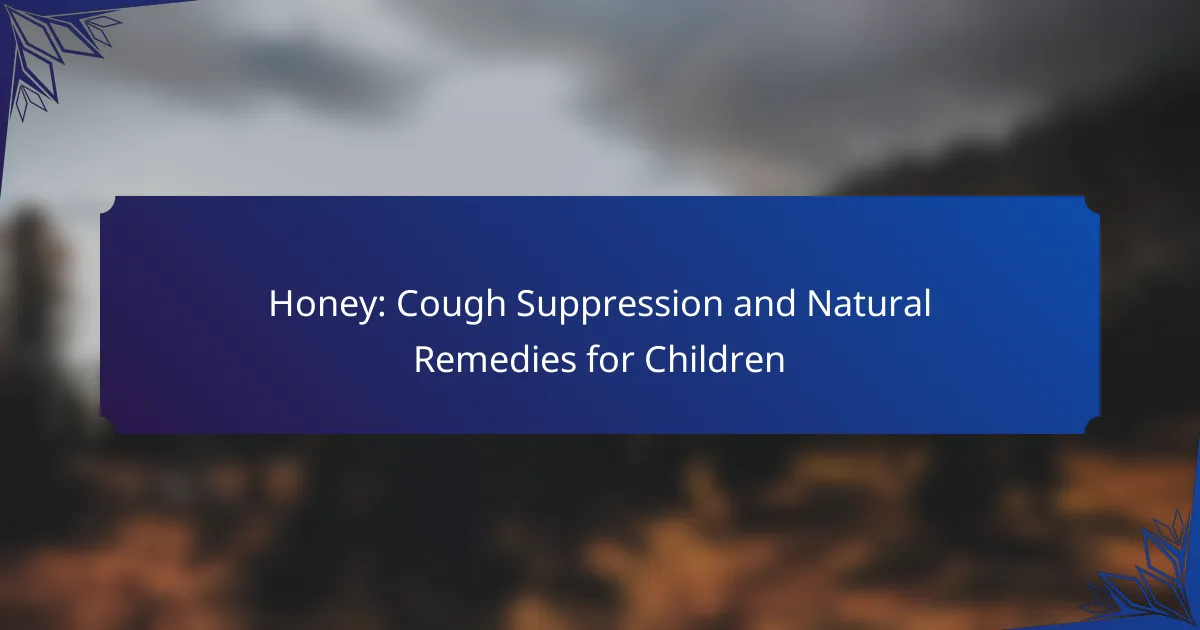Honey is a popular natural remedy for cough suppression in children, known for its soothing properties and antimicrobial effects. It can help alleviate throat irritation and reduce coughing frequency, making it an appealing alternative to over-the-counter medications. However, it’s important to note that honey should only be given to children over one year of age to avoid the risk of botulism.
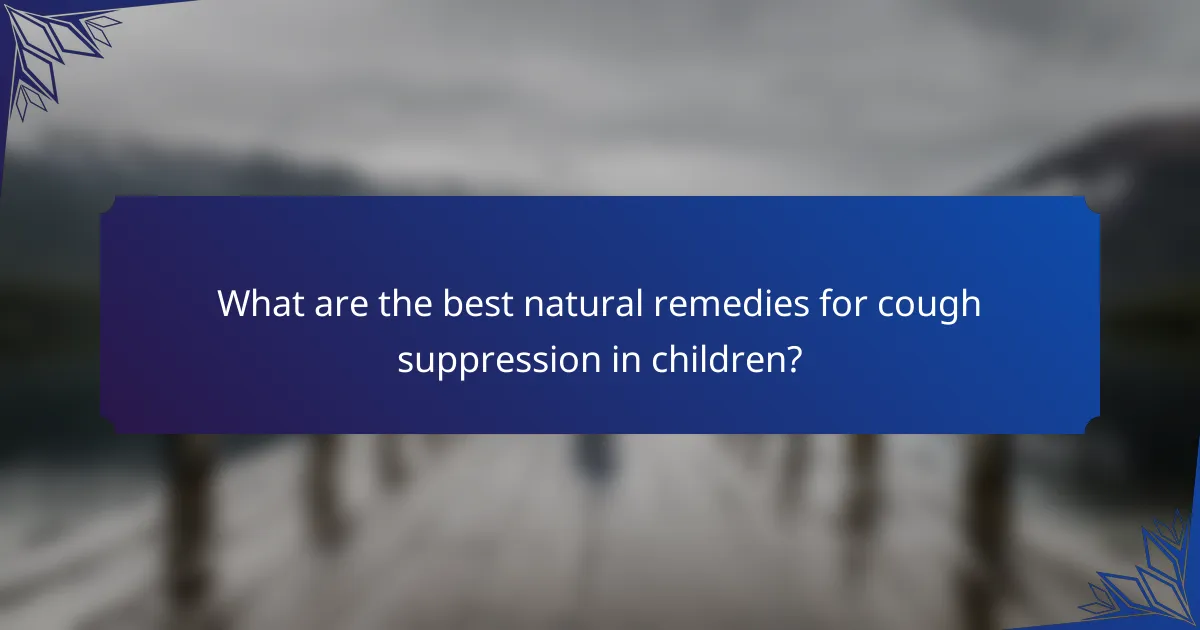
What are the best natural remedies for cough suppression in children?
Effective natural remedies for cough suppression in children include honey, ginger tea, throat lozenges with natural ingredients, steam inhalation, and humidifiers. These options can provide relief without the side effects often associated with over-the-counter medications.
Honey as a cough suppressant
Honey is a well-known natural cough suppressant that can be particularly effective for children over one year old. It works by coating the throat, which helps to soothe irritation and reduce the urge to cough.
When using honey, consider giving 1-2 teaspoons before bedtime. This can help improve sleep quality by minimizing nighttime coughing. Always ensure that honey is suitable for the child’s age, as it should not be given to infants under one year due to the risk of botulism.
Ginger tea for soothing cough
Ginger tea is another excellent natural remedy for coughs, thanks to its anti-inflammatory properties. It can help soothe the throat and reduce coughing episodes.
To prepare ginger tea, steep fresh ginger slices in hot water for about 10 minutes. Adding honey can enhance its effectiveness and flavor. Children can drink this tea 1-2 times a day, but be cautious with the amount of ginger, as too much can cause stomach upset.
Throat lozenges with natural ingredients
Throat lozenges containing natural ingredients like honey, lemon, or herbal extracts can provide relief for coughs and sore throats. These lozenges work by lubricating the throat and reducing irritation.
Choose lozenges specifically designed for children, and follow the recommended dosage on the packaging. It’s essential to supervise young children while using lozenges to prevent choking.
Steam inhalation benefits
Steam inhalation can help relieve coughs by moisturizing the airways and loosening mucus. This method is particularly beneficial for children with congestion or a dry cough.
To perform steam inhalation, fill a bowl with hot water and have the child lean over it with a towel draped over their head to trap the steam. Limit sessions to about 10-15 minutes, and ensure the water is not too hot to avoid burns.
Humidifiers for cough relief
Using a humidifier in the child’s room can help alleviate cough symptoms by adding moisture to the air. This is especially useful during dry seasons or in air-conditioned environments.
Choose a cool-mist humidifier and keep it clean to prevent mold and bacteria growth. Aim for a humidity level of 40-60% for optimal results, and monitor the child’s comfort level to avoid excessive moisture.
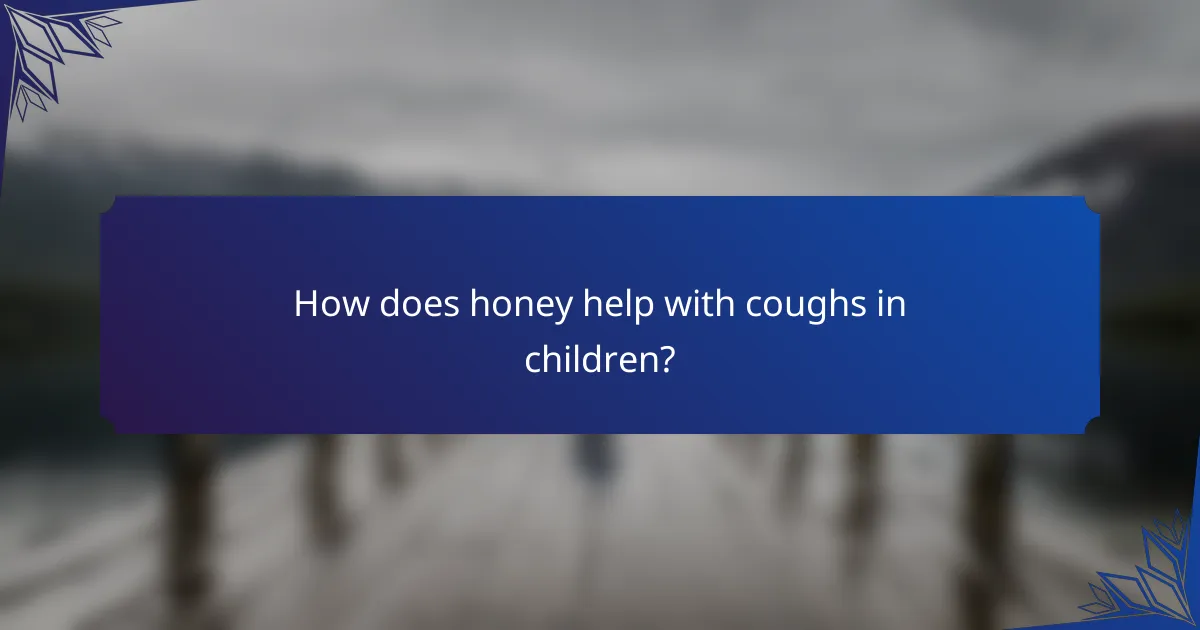
How does honey help with coughs in children?
Honey can effectively help with coughs in children by providing natural relief through its soothing properties and antimicrobial effects. It is often used as a remedy to alleviate throat irritation and reduce the frequency of coughing, making it a popular choice for parents seeking alternatives to over-the-counter medications.
Antimicrobial properties of honey
Honey possesses natural antimicrobial properties that can help combat infections. Its high sugar content and low moisture levels create an environment that is inhospitable to bacteria and viruses. This makes honey a beneficial option for children suffering from coughs caused by infections.
Research indicates that certain types of honey, such as Manuka honey, have enhanced antibacterial effects. These properties can support the immune system and potentially shorten the duration of a cough associated with respiratory infections.
Soothing throat irritation
One of the primary benefits of honey is its ability to soothe throat irritation, which is often a trigger for coughing. When ingested, honey coats the throat, providing a protective layer that can reduce discomfort and irritation.
For children, a teaspoon of honey can be mixed with warm water or herbal tea to enhance its soothing effects. This combination not only helps alleviate irritation but also encourages hydration, which is essential during illness.
Honey’s role in reducing cough frequency
Honey has been shown to reduce cough frequency in children, particularly at night. Studies suggest that a dose of honey before bedtime can lead to fewer coughing episodes, allowing for better sleep and recovery.
For effective use, a teaspoon of honey can be given to children aged one year and older. However, it is important to avoid giving honey to infants under one year due to the risk of botulism. Parents should monitor their child’s response and consult a healthcare provider if cough persists or worsens.
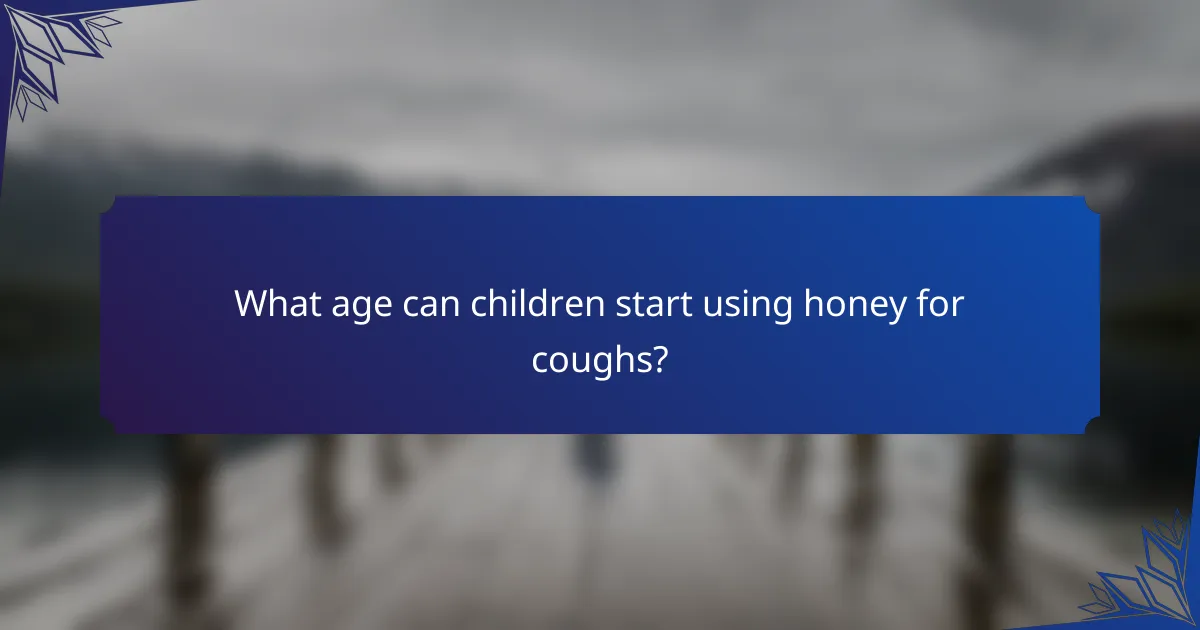
What age can children start using honey for coughs?
Children can start using honey for coughs at around 1 year of age. Honey should not be given to infants under 12 months due to the risk of botulism, a rare but serious illness.
Safe age for honey consumption
The safe age for honey consumption is typically from 12 months onward. At this age, children’s digestive systems are more developed, reducing the risk of botulism. Parents should always ensure that honey is pure and free from additives.
For children aged 1 to 5 years, honey can be a soothing remedy for coughs, but it should be used in moderation. A teaspoon before bedtime can help alleviate nighttime coughing.
Recommendations from pediatricians
Pediatricians generally recommend honey as a natural cough suppressant for children over 1 year old. It is considered a safer alternative to over-the-counter cough medications, which are not advised for young children.
Parents should consult with their child’s doctor before introducing honey, especially if the child has allergies or other health concerns. It’s also important to monitor the child for any adverse reactions after consumption.

What are the risks of using honey for coughs?
Using honey for cough suppression can pose certain risks, particularly for specific age groups and individuals with allergies. It is essential to understand these risks to ensure safe use, especially in children.
Potential allergies to honey
Some individuals may experience allergic reactions to honey, particularly those with pollen allergies or sensitivities. Symptoms can range from mild reactions, such as hives or itching, to more severe responses like difficulty breathing. Parents should monitor their children closely when introducing honey for the first time.
If a child has known allergies to bee products or pollen, it is advisable to avoid honey altogether. Consulting with a healthcare provider before using honey as a remedy is a prudent step to ensure safety.
Botulism risk in infants
Honey can contain spores of Clostridium botulinum, which can lead to infant botulism in children under one year of age. This condition can cause severe illness, including muscle weakness and breathing difficulties. For this reason, honey should never be given to infants.
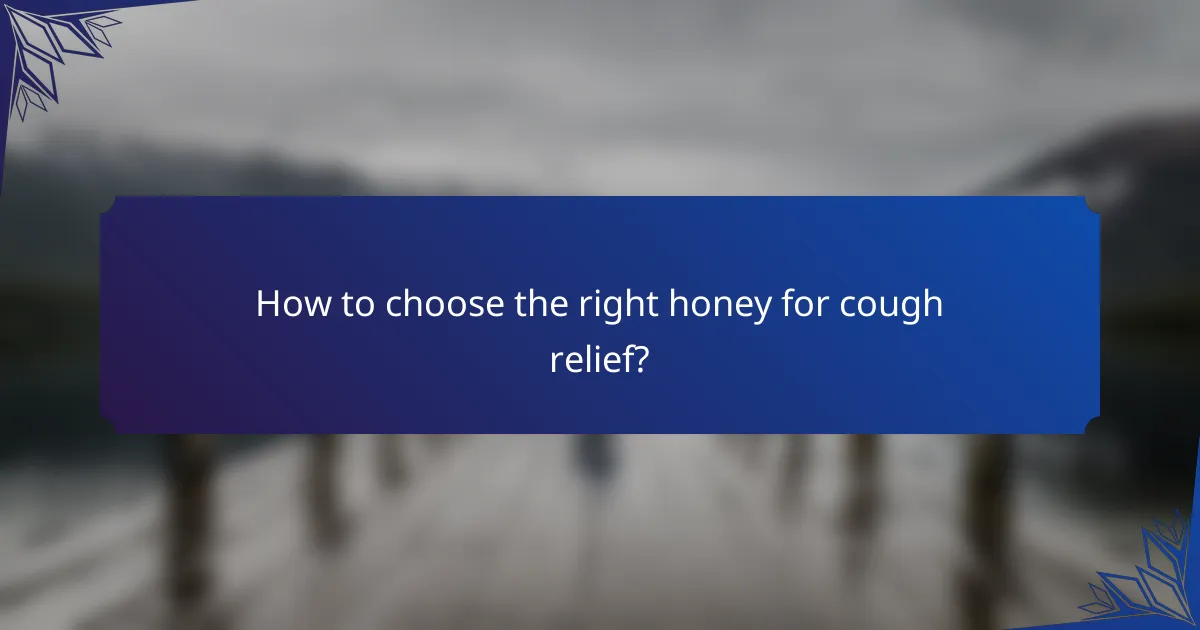
How to choose the right honey for cough relief?
Selecting the right honey for cough relief involves considering factors like its type, source, and processing methods. Raw honey is often preferred for its natural properties, while local honey may provide additional benefits due to its regional pollen content.
Raw vs. processed honey
Raw honey is unheated and unfiltered, preserving its natural enzymes, antioxidants, and antibacterial properties. This makes it a more effective option for soothing coughs compared to processed honey, which may lose some beneficial compounds during pasteurization.
When choosing honey, look for labels that specify “raw” to ensure you are getting the full health benefits. Processed honey is often sweeter but may not provide the same cough-suppressing effects.
Local honey benefits
Local honey can be particularly beneficial for children suffering from seasonal allergies, as it may contain small amounts of local pollen. This exposure can help build immunity and reduce allergic reactions over time.
Additionally, using honey sourced from nearby beekeepers supports local agriculture and ensures freshness. Look for honey labeled with the specific region or local producer to maximize these benefits.
Organic certifications
Choosing honey with organic certifications ensures that the bees were not exposed to harmful pesticides or chemicals. Organic honey is produced from flowers that have been grown without synthetic fertilizers or pesticides, making it a safer choice for children.
When selecting organic honey, check for certifications from recognized bodies, such as the USDA in the United States or equivalent organizations in other countries. This guarantees that the honey meets strict organic standards.
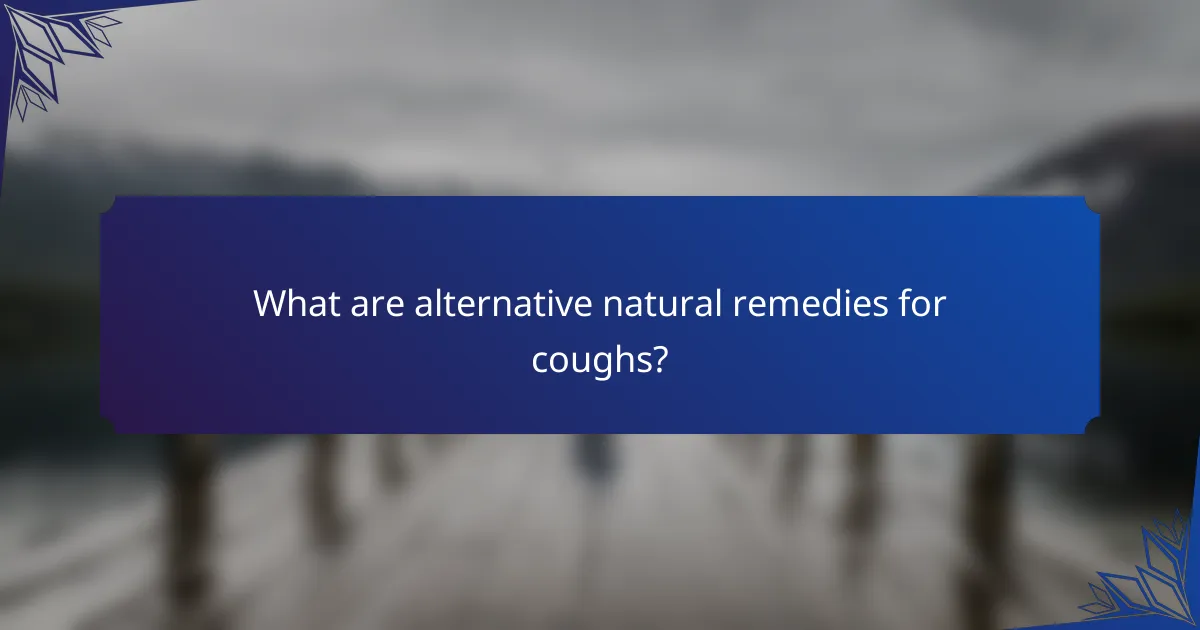
What are alternative natural remedies for coughs?
Alternative natural remedies for coughs include various herbal treatments that can help soothe irritation and reduce coughing. These remedies often utilize ingredients like marshmallow root, thyme, and licorice root, which have been traditionally used for their soothing properties.
Marshmallow root benefits
Marshmallow root is known for its mucilage content, which can coat the throat and alleviate irritation. This soothing effect can help reduce the frequency and intensity of coughing, making it a popular choice for children experiencing coughs.
To use marshmallow root, it can be prepared as a tea or taken in syrup form. When using it for children, ensure that the dosage is appropriate for their age and weight, typically starting with small amounts and adjusting as needed.
Thyme tea effectiveness
Thyme tea is recognized for its antimicrobial and expectorant properties, which can help clear mucus and ease coughs. The active compounds in thyme can relax the muscles of the respiratory tract, providing relief from persistent coughing.
To prepare thyme tea, steep fresh or dried thyme leaves in hot water for several minutes. This herbal remedy can be sweetened with honey for added flavor, but honey should not be given to children under one year old due to the risk of botulism.
Licorice root for cough relief
Licorice root has been traditionally used for its anti-inflammatory and soothing properties, making it effective for cough relief. It can help reduce throat irritation and promote mucus production, aiding in the expulsion of phlegm.
Licorice root can be consumed as a tea or in syrup form. However, it is important to monitor the dosage, as excessive consumption can lead to side effects such as elevated blood pressure. Always consult with a healthcare provider before administering licorice root to children, especially if they have underlying health conditions.
